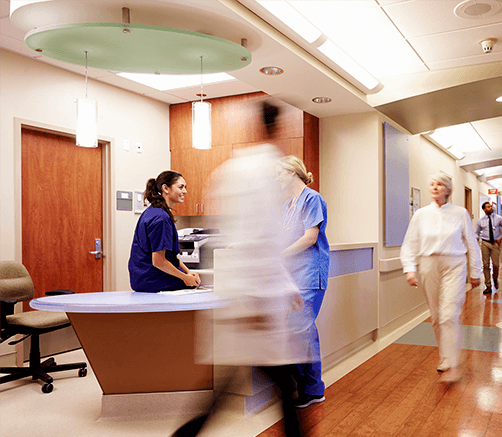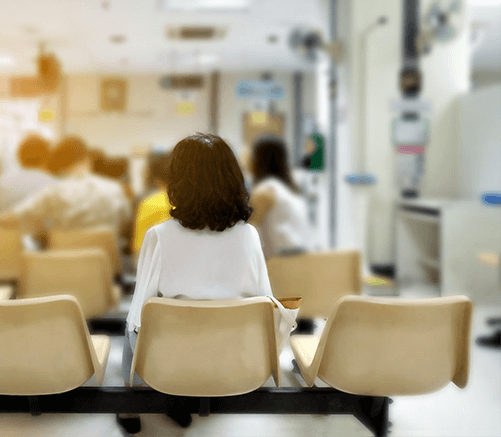There are over 50,000 healthcare scientists working in the NHS and public health services across the UK. Together they provide the scientific backbone of the NHS and their work underpins 80% of all diagnoses. The healthcare science workforce transform lives through prevention, diagnosis, monitoring, treatment and rehabilitation. Careerwise, there are more than 50 specialisms, but they all fall in to four main professional areas;
1) Life sciences,
2) Physiological sciences,
3) Physical sciences
4) Clinical bioinformatics.
To find out more about the types of jobs Healthcare Science professionals do, click here.
Welcome to the Healthcare Science Faculty Page. I’m Louise Hawke and I am a principal clinical scientist working in Biochemistry in the Pathology department.
Clinical Biochemistry is a varied and interesting field. Our automated laboratories at Worcester and Redditch process thousands of samples a day both from the acute trust and primary care; providing analysis of many different tests including kidney and liver function, thyroid hormones and cardiac markers. We have a proteins section looking a myeloma screening and monitoring and HbA1c analysis. At our Redditch site faecal testing is performed for faecal haemoglobin (FIT), part of the colorectal cancer diagnosis pathway. There’s a great team in the laboratory and my role is varied, including providing interpretation of tests, liaising with our users, overseeing quality, running a section of the laboratory and training staff. There are always new developments and it’s exciting to keep up with these and work with clinicians to improve patient care.
My route into clinical biochemistry was fairly traditional and began with studying Biochemistry at the University of Sheffield for my undergraduate degree, which I really enjoyed. I then did a PhD, which gave me lots of transferable skills, but I was keen to use my knowledge in a clinical setting instead of continuing in pure academic research. I therefore applied for the clinical scientist training programme and became a trainee clinical scientist in Biochemistry at Derby and Nottingham Hospitals. The training programme gave me experience in different areas of biochemistry, including the automated section, HPLC and mass spectrometry, paediatric biochemistry and toxicology. It also included a part-time MSc in Clinical Biochemistry, to provide the knowledge to underpin the practical work I was doing. At the end of the training programme I became a HCPC registered clinical scientist and started as a senior clinical scientist at Royal Derby Hospital. I moved to Worcestershire Acute five years ago and really enjoy my work in Biochemistry and Pathology. I’ve also recently started chairing the healthcare science faculty of the ICS Academy and it’s been great to work with colleagues across the healthcare science specialities.
Following HCPC registration I have worked towards completing my Royal College of Pathology exams to become a Fellow of the college, with lots of support from my colleagues. It’s not always easy working, studying and keeping up with family life, but I still find clinical biochemistry fascinating and would recommend a career as a clinical scientist to anyone who enjoys science and would like to apply their knowledge in a really rewarding environment.
Hello, my name is Kelly Bill. I am a clinical scientist working within the field of Neurophysiology.
In 1994 I started working as a trainee Neurophysiology Technologist at City Hospital in Birmingham - this still only feels like yesterday! 28 years later and I am the Clinical Service Manager at Worcestershire Acute Hospitals. Over this time, I have worked through the many changes and challenges that have faced Neurophysiology and the NHS over the years.
When people ask how did you get into neurophysiology, the answer is simple, by accident. I think it’s fair to say this is probably the response for most of us working in Neurophysiology.
However, I love my job today as much as the first day I started.
What is Neurophysiology? It is a predominantly diagnostic filed that is concerned with investigating the function of the central and peripheral nervous system. It is a patient facing speciality working on both adults and paediatrics. Therefore, it is diverse and offers a wide range of skills and knowledge.
My route into Neurophysiology was through the MPPM (medical Physics and Physiological measurement) training programme at Matthew Bolton College. I was 16 years old, having just done my GCSE’s and never worked in a Hospital. I remember the overwhelming feeling of ‘what have I done’, all of my friends were off doing A levels and I was going to work, to learn a career. However, I have never looked back. Every stage of my career has been supported by training and development.
Neurophysiology is a career with a clear career pathway. Development through accredited training routes allows individuals to obtain skills and knowledge from practitioner to consultant scientist.
Education and training is one of my passions and I have been directly involved with our professional body ANS (EPTA), since around 2000, mainly as support to the Education subcommittee which strives to equip our workforce with the skills, knowledge and confidence to meet the ever increasing demands of the services that we provide.
Health care science is often the forgotten area of the NHS but it must not be forgotten and raising awareness is paramount to ensuring that.



